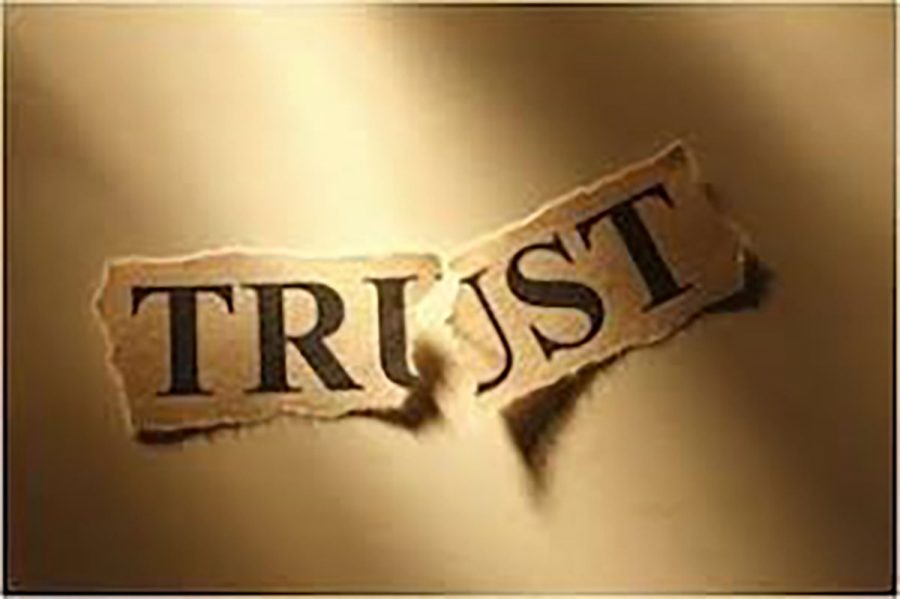Surviving betrayal and trusting again
Trust is essential for many relationships, mending it if it’s broken is vital
Photo by Submitted
Trust isn’t easy to build when it’s been broken, but there are possibilities in doing so.
Relationships, whether they be personal or work-related, require many qualities in order to be considered healthy, such as trust and good communication. Without those, a relationship is likely to be considered toxic and abusive.
Relationships can often start out well; everything appears to be grounded, both people enjoy each other’s company and seem to be in love. Sometimes it doesn’t stay this way.
One day, a person might find themself having trouble trusting their partner and believing every word that comes out of their mouth.
In an article by Steven Stosny, he said human beings need to trust —it allays anxiety and makes it possible to consistently portray interest and enjoyment in a relationship.
When betrayal is present, Stosny said most people respond to this inner turmoil in one of three ways: putting blind trust in someone without having demonstrated reliability or trustworthiness, being constantly suspicious of the possibility of betrayal, or recognizing the fact that humans are frail and capable of betrayal in weaker moments.
Personally, I am constantly suspicious of the possibility of second-time betrayal. I trust people until they do something to show me I shouldn’t.
It’s incredibly hard to regain trust after being put through something (or multiple events) that strip it away day by day.
The recovery of betrayal usually depends on the situation, but I often find myself asking the same questions: What are they doing right now, who are they with, and who are they talking to?
This is anxiety at its purest.
Inside, I know I don’t want to be asking these questions and feeling this way. When someone loves a person for so long, it’s hard to stop at the moment of betrayal. The feeling of love and betrayal towards one person contradict each other, and it makes a person feel gross inside.
In an article by John Gottman, he said it turns out when social psychologists ask people in relationships, “What is the most desirable quality you’re looking for in a partner when you’re dating?”, trustworthiness is number one.
Even outside of personal relationships, trust is important for healthy communities as well. Gottman also said in his article that in recent research on social capital, sociologists asked people, “Do you think people can be trusted?”
He said the research showed exceptionally low- and high-trust regions in the United States.
“Low trust areas have greater economic disparities between the very rich and the very poor — and the greater the discrepancy between the very rich and the very poor in a country, the more it predicts economic decline in that country,” Gottman said.
Trust is important even in countries as a whole to keep their economies from declining. The same goes for relationships: trust is needed to keep the relationship from crashing or ending.
In times of rebuilding the foundation of trust, Gottman said it is built in very small moments, which he refers to as “sliding door” moments. Sliding door moments are when there is a possibility of connecting with the other person or turning away from them.
Disclaimer: the example that is about to be given is not related to the reason for this article.
For instance, say my mom gets home from work and has an upset look on her face. I have a choice to either confide in her and give her my attention, or ignore her and move on with my day.
Making the decision to let her open up to me about what has her down was an act of building trust; I would have been there for her, connecting with her rather than choosing to ignore her.
One small moment like that won’t make a world of a difference when trying to build trust, it’s constantly choosing to not turn away that helps build it.
All in all, trust is complex in its meaning and actions, but maintaining it and mending it when possible is absolutely essential to any healthy relationship.
Dirks can be reached at dirksmk5617@uwec.edu

McKenna Dirks is a fourth-year journalism student and this is her seventh semester on The Spectator staff. She thrives under chaotic environments, loves plants and often gives off "granola girl" vibes with her Blundstone boots.


